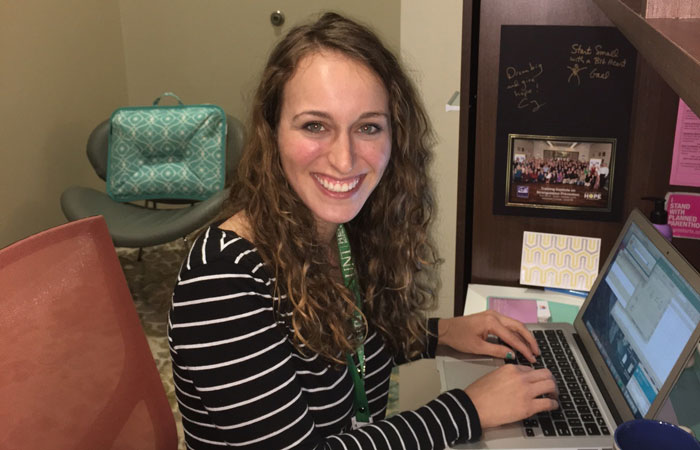Recognizing the value of a welcoming environment
Alita Andrews, a 2016 School of Public Health MPH graduate, is a Health Advocate for the UNT Health Science Center TESSA program that serves Tarrant County victims of interpersonal violence.
In the beginning, she met clients in a traditional office setting, with a desk facing the door and two chairs in front.
But over time, Andrews transformed her office at One Safe Place – a non-profit agency in Fort Worth that gives help and hope to families and individuals looking to get back on their feet – into a warmer, more welcoming environment.
Her desk was moved to the side, eliminating the physical barrier between health advocate and client. A cozy rug and more relaxing chairs were added to invite quiet, one-on-one conversations.
Clients could feel safe knowing they no longer had to sit with their back to the door. A storage closet was updated to create a coffee nook.
Dim lighting and calm colors also helped with the change. Stress balls, adult coloring books and other counseling aids were provided to offer relief during difficult moments.
Her idea – representing just one of the ways Andrews cares for clients and helps them feel more secure and welcomed – was recently recognized at the One Safe Place five-year anniversary, where she was presented an award for exemplifying one of the agency’s top core values of “safety.”
“The role of the health advocate is to give people choices and help them take control of their lives,” said Jessica Grace, LMSW, TESSA Program Manager. “It may be overwhelming at first, which is why it’s so important to welcome them in a space that feels comforting. We want clients to know it’s more about them than a complicated process or system.”
Andrews helps clients focus on their mental and physical well-being, self-care strategies, personal safety and navigation of health resources to improve their overall health outcomes.
Her role is different from that of a counselor or case manager, as she specifically focuses on the impact that violence and trauma can have on health.
She works with individuals like the young mom battling serious effects of diabetes because her abuser wouldn’t allow her to seek medical care for her condition. Or the middle-aged woman suffering from high blood pressure, panic attacks and other health issues related to the physical and emotional harm she had endured for years.
Andrews said the clients are her main motivator for coming to work every morning.
“They have all come to One Safe Place to find support and a new start. Wherever they are in their journey, I’m happy to be a cheerleader and support system to helping them find themselves,” she said.
Organizations like One Safe Place, which houses 18 different victims’ advocate agencies, are important in connecting individuals with health care resources, children’s services, law enforcement and legal aid, counseling, employment programs, housing resources and more.
Approximately one in three Texas women will experience domestic violence during their lifetime. For the years 2014 and 2015, Tarrant County was the second-highest community in Texas for domestic violence deaths.
Since 2015, TESSA has been led by Dr. Emily Spence-Almaguer, SPH Associate Professor and Associate Dean for Community Engagement and Health Equity. TESSA is funded by the U.S. Department of Health and Human Services, Office on Women’s Health.
“The clients we see are so resilient and are survivors; their strength is awe-inspiring,” Andrews said.
“Some of my best experiences are when clients I haven’t heard from in a while call and update me on their progress and all the things they’re now doing on their own,” she said. ”It’s a great honor to watch this happen, and I’m happy to be a part of it.”







Social media